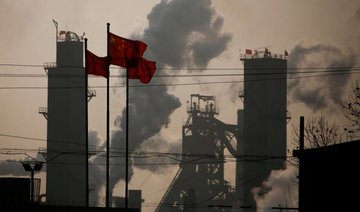JAKARTA: Green activists are urging the Indonesian government to take firm action against thousands of factories on the banks of Citarum River in Indonesia’s West Java province that have been polluting the river and its tributaries for decades.
Indonesia has announced its ambitious seven-year program target to clean up what has been labeled as the most polluted river the world.
Dwi Sawung, urban and energy campaigner from the oldest and the largest environmental advocacy NGO – the Indonesian Forum for the Environment (Walhi) – said it would take at least 15 years to rehabilitate the river from rampant chemical industrial waste that has scummed over the river’s once-pristine water.
“It will not work unless the government gets tough on those factories, especially the big ones. Law enforcement agencies have been lenient, slapping only small fines on them. Rehabilitating the river would be much easier if the pollution only comes from household garbage,” Dwi told Arab News.
The Indonesian government plans to issue a presidential regulation that will mandate the establishment of a government task force overseeing an integrated effort to clean up the 297-kilometer-long river flowing from the southern part of the province to the north.
“We plan to issue the presidential regulation within a week or two,” Safri Burhanudin, the deputy minister for resources, science and technology at the Coordinating Ministry for Maritime Affairs told Arab News.
Safri said the Coordinating Minister for Maritime Affairs Luhut Pandjaitan will head the task force, which will involve various ministries, army, police and local administrations the river runs through.
The effort kicked off on Feb. 1 at the river’s upstream area in Cisanti Lake of Bandung district and was marked by President Joko Widodo planting a tree at the lake on Feb. 22. After the ceremony, the president tweeted from his official account that the government is making the quickest effort possible to clean the river so that it can be a source of drinking water in seven years.
Yuliarto Putranto, director of watershed management planning at the Ministry of Environment and Forestry, said the ministry’s efforts of replanting trees in the upstream region started in 2015 and this year it plans to plant trees in a 2,500-hectare area to prevent further erosion and sedimentation along the river.
“We have to reduce sedimentation as low as possible since it causes flooding and we start where the water originates,” Yuliarto told Arab News.
“The government has to stop issuing permits for land conversion projects along the river’s waterways, because they strip the river of its vegetation areas,” Dadan Ramdan, the West Java chapter executive director of Walhi told Arab News.
There are about 2,000 factories, including textile plants, along the river that dump their waste into the water and, according to Dadan, some 500 are within the Bandung basin region.
The Citarum River and its tributaries serve as an important water supply to roughly 27.5 million inhabitants in the greater area of Bandung, the provincial capital of West Java, and the greater Jakarta region. It supplies 80 percent of water to the Indonesian capital, Jakarta, and irrigates around 420,000 hectares of rice farms.
Indonesia embarks on Herculean project to clean world’s most polluted river
Indonesia embarks on Herculean project to clean world’s most polluted river














